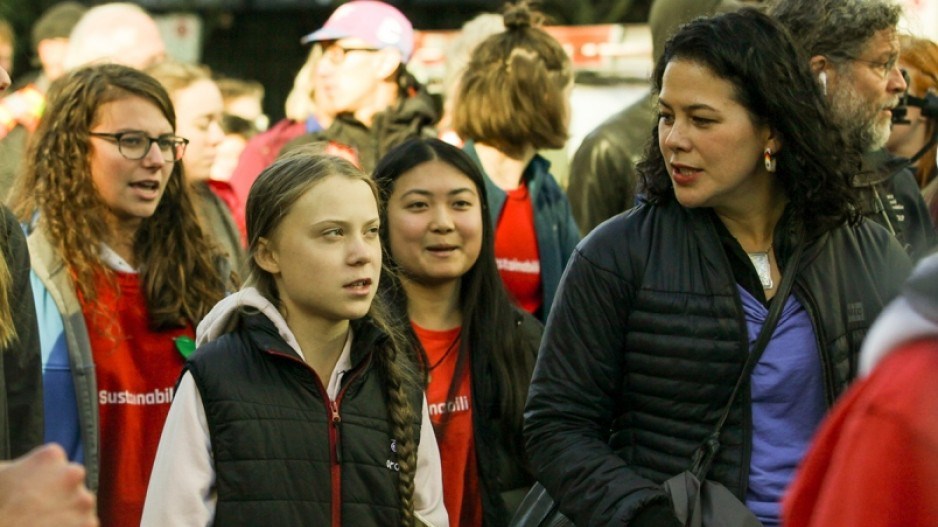Running an election campaign with no credible planks on curbing greenhouse gases (GHGs) may have helped Andrew Scheer’s Conservative Party of Canada in Alberta and Saskatchewan, but in other parts of the country it may have been viewed as a serious omission.
As Toronto Star columnist Chantal Hébert put it: “This should be the last election that any party in this country believes it can win without having a serious plan for climate change.”
Justin Trudeau’s Liberal Party of Canada may not have won a majority in last week’s federal election, but groups like the Pembina Institute and Clean Energy Canada say climate change was a ballot issue and that voters have given Trudeau a mandate to continue with his government’s climate change policies.
Pollster Mario Canseco, president of Research Co., said it would be an overstatement to say climate change was a major ballot issue. Environment was the top issue in Quebec and second from top in B.C., he said, but less of a priority elsewhere.
“There is indeed a greater concern about climate change among residents who did not vote for the Conservatives, but this was not an election fought solely on the basis of climate policies.”
But those who read last week’s election results as a referendum of sorts on climate change and carbon taxes included New Brunswick Progressive Conservative Premier Blaine Higgs. His province is among those that have opposed a federal carbon tax.
Following last week’s federal election, Higgs announced New Brunswick will look at implementing its own provincial carbon tax.
“People voted for it, so we have to find a way in New Brunswick to make it work,” he told the CBC.
The Liberals pledged to build on their climate change policies with more money for clean power and electrification, zero-emission vehicle incentives and legally binding five-year milestones for meeting GHG emission reduction targets.
Merran Smith, executive director for Clean Energy Canada, said climate change policy is one plank where a Liberal minority government can expect support from other parties – the Green Party of Canada, NDP and Bloc Québécois.
“That looks like an area that the government could move forward quickly with support,” she said.
Trevor Tombe, associate economics professor at the University of Calgary, agrees.
“Given the minority situation and given the parties and configuration, yeah, I think that the federal government will have an easier time moving forward on climate policy than on some other issues,” he said.
Because the Trudeau government is copying B.C. and Quebec on many of its climate policies, those provinces are not affected by the national strategy, except to the extent that it makes for a more level playing field and puts industries there at less of a disadvantage.
The one area where B.C. may directly benefit from federal policies is through the $5 billion clean-power fund promised in the 2019 Liberal platform. It includes funding for the electrification of industry – something B.C. is already doing with its upstream natural gas sector.
“The clean power fund, that could support B.C. in its initiatives to electrify our industries and our manufacturing here,” Smith said. “There was also a commitment around zero-emission transit.”
Mark Jaccard, professor of sustainable energy at Simon Fraser University, said he expects the Trudeau government will implement either a national clean fuel standard, a national zero-emission vehicle mandate or carbon prices that begin to rise above $50 per tonne after 2022.
“None of the above three are essential,” Jaccard added. “But you have to have at least one of them, at a rising stringency.”
University of British Columbia political scientist Richard Johnston agrees that climate change was an issue in the federal election, but notes that Canadians who say they want governments to address climate change don’t necessarily want to foot the bill.
“I think there is this kind of general vague notion of concern about climate change, not accompanied, however, by much willingness to pay the cost,” Johnston said. “That said, the Liberals are in government, the carbon tax is something that they can take credit for, and we will get used to it.
“It will survive this Parliament and people might start noticing the paycheques [rebates]. It might just become normalized, the way it has in British Columbia.”
It is worth noting that one of the more important federal climate change strategies – one that gets nowhere near the attention that carbon taxes do – is a pledge to phase out coal power by 2030.
Alberta and Saskatchewan would shoulder the biggest burden from this promise, because both rely on coal for much of their power. But neither province appears to be objecting to that 2030 phase-out target.
“That horse has left the barn,” Tombe said. “There’s no turning back and the UCP [United Conservative Party] has made no indication that they want to turn it back. If anything, their proposed structure for the large emitter carbon tax will continue the incentive for companies to phase out coal on their own.”




